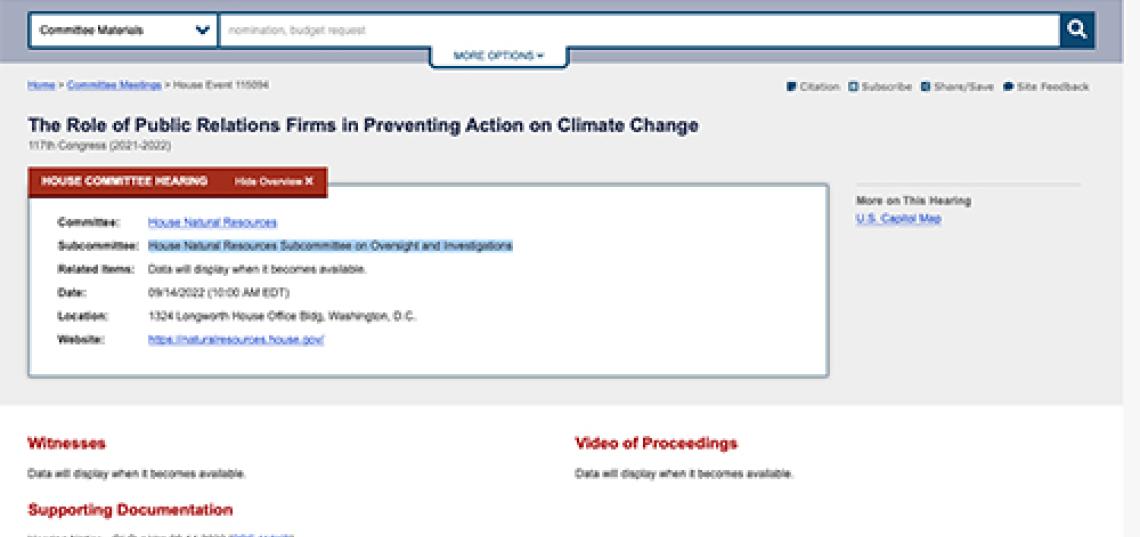
On September 14, 2022, Associate Professor of Journalism and Media Studies Melissa Aronczyk testified before the U.S. House of Representatives Committee on Natural Resources Subcommittee on Oversight and Investigations in the hearing, “The Role of PR Firms in Preventing Action on Climate Change,” chaired by Rep. Katie Porter.
The House Committee on Natural Resources, according to their website, “advances the interests of the indigenous peoples and residents of the territories of the United States, and considers legislation and oversees federal conservation and species protection programs under the leadership of Chairman Raúl M. Grijalva.”
Aronczyk's current research and teaching addresses issues related to media and political communication; media theory; critical methodologies; promotional cultures; and writing as craft and as profession. One of three witnesses to present evidence, Aronczyk said she drew on research from her recent co-authored book, “A Strategic Nature: Public Relations and the Politics of American Environmentalism” (Oxford, 2022).
The hearing was livestreamed on the Committee’s YouTube channel; it was recorded; and her written testimony will be entered into the congressional record.
“I’m glad to have been asked and I recognize the honor and privilege this opportunity affords,” Aronczyk said.
Commenting on her experience, Aronczyk posted to Twitter, “During the testimony I heard a lot of anti-climate rhetoric from opposing committee members. I was struck by how their rhetoric echoed anti-environmental frames that PR firms have used for over 50 years to promote fossil fuel clients. Here are 10 of the frames:
- Fear. ‘We need to keep the lights on at home.’ ‘What if the energy grid fails in minus 20 degree weather.’ ‘How will Americans get groceries or food.’
- Tradeoffs. ‘It’s either about the economy or the environment.’ The public is told to choose one or the other to support.
- Speaking for the public. ‘I’m just elevating the voices of hardworking Americans in the industry.’ (Complicated by PR’s use of corporate-funded astroturf mobilizing of local groups).
- Rational vs emotional actors. ‘Why can’t we have a civil debate about this.’ ‘[PR campaigns] are just someone in a public arena having a debate.’
- Everyday life. ‘My bike helmet is made from fossil fuels.’
- Truth/Facts. ‘We just want the truth here. ‘They [environmental advocates] don’t have the facts.’
- Delay. ‘We will need oil and gas production for decades to come.’
- Domestic security. ‘Look what is happening in Europe and their reliance on Russian oil and gas.’
- Data. ‘Data doesn’t lie.’ ([wide-eyed emoji] for all my critical research methods students).
- Not me but you. ‘The party is intimidating PR firms [vs. PR firms intimidating environmental activists].” “The party is misleading the American people [vs. PR firms misleading the public].’”
Aronczyk is the recipient of a Climate Social Science Network grant (2021-2023) to critically inquire into the mobilization of industrial influence resources and their bearing on collective decision-making around climate change action in the United States. This two-year project will combine theoretical perspectives on elite political and communication networks and the nature of influence with empirical research on interorganizational dynamics and public promotional/advocacy activities among corporate, government and non-governmental actors.
In the media:
O’Dwyer’s PR News: Congress Debates PR’s Role in Preventing Climate Action
DeSmog: House Committee Investigates the Role of PR Firms in Spreading Climate Disinformation
PRovoke Media: Congressional Hearing Probes PR's Work For Big Oil
PRWeek: House Democrats hold hearing on PR firms’ work for oil companies
Nation of Change: House Committee Investigates the Role of PR Firms in Spreading Climate Disinformation
Drilled News: Messaging Consistency
The Good Men Project: House Committee Investigates the Role of PR Firms in Spreading Climate Disinformation
Adweek: 'This Should Be a Turning Point': Congress Goes After PR Firms Obstructing Climate Policy
Discover more about the Journalism and Media Studies Department on the Rutgers School of Communication and Information website.
